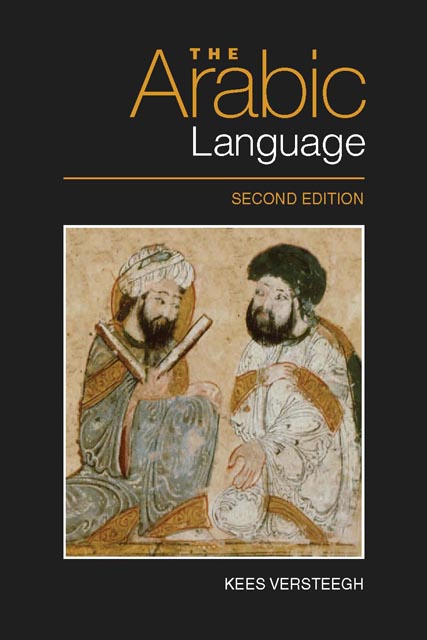Book contents
- Frontmatter
- Contents
- Preface to First Edition
- Preface to Second Edition
- List of Figures and Maps
- List of Tables
- Note on Transcription and Glossing
- 1 The Study of Arabic in the West
- 2 Arabic as a Semitic Language
- 3 The Earliest Stages of Arabic
- 4 Arabic in the Pre-Islamic Period
- 5 The Development of Classical Arabic
- 6 The Structure of Arabic
- 7 The Arabic Linguistic Tradition
- 8 The Emergence of New Arabic
- 9 Middle Arabic
- 10 The Study of the Arabic Dialects
- 11 The Dialects of Arabic
- 12 The Emergence of Modern Standard Arabic
- 13 Diglossia
- 14 Bilingualism
- 15 Arabic as a Minority Language
- 16 Arabic Pidgins and Creoles
- 17 Arabic as a World Language
- Bibliography
- List of Abbreviations
- Index
- Frontmatter
- Contents
- Preface to First Edition
- Preface to Second Edition
- List of Figures and Maps
- List of Tables
- Note on Transcription and Glossing
- 1 The Study of Arabic in the West
- 2 Arabic as a Semitic Language
- 3 The Earliest Stages of Arabic
- 4 Arabic in the Pre-Islamic Period
- 5 The Development of Classical Arabic
- 6 The Structure of Arabic
- 7 The Arabic Linguistic Tradition
- 8 The Emergence of New Arabic
- 9 Middle Arabic
- 10 The Study of the Arabic Dialects
- 11 The Dialects of Arabic
- 12 The Emergence of Modern Standard Arabic
- 13 Diglossia
- 14 Bilingualism
- 15 Arabic as a Minority Language
- 16 Arabic Pidgins and Creoles
- 17 Arabic as a World Language
- Bibliography
- List of Abbreviations
- Index
Summary
The definition of ‘Middle Arabic’
In the preceding chapters, both the development ofliterary Arabic and the emergence of colloquialArabic have been discussed. A principal questionthat we should now address concerns the relationshipbetween these two varieties of the language in thewritten production, both literary and non-literary,in early Islam. The language of many of thepreserved written sources does not correspond to theform of Arabic as it was codified by the grammaticaltradition. This applies both to the formal literarylanguage of the later period and to the language ofthe early papyri. No grammarian, for instance, wouldever use a form such as yaktubū instead of yaktubūna for the indicative of theverb, but this form regularly turns up both in thepapyri and in some written texts. Since this is theform that the contemporary dialects use, the obviousconclusion is that this usage reflects thevernacular of the writer. In this chapter, we shalllook at the source of the deviations from theClassical norm in written texts.
In modern studies of Arabic, the collective name forall texts with deviations from Classical grammar isMiddle Arabic. The term in itself has led to a lotof ambiguity, and it is essential to explain firstwhat it does not mean. In the history of English,Old English, Middle English and Modern English aredistinguished as chronological periods, and it istempting to take the term Middle Arabic to mean astage of the language between the Classical periodand the modern period, say between 800 and 1800. Asa matter of fact, some writers use the term ‘MiddleArabic’ in this way. In his handbook of ChristianMiddle Arabic (1966–7: I, 36), Blau stated that‘M[iddle] A[rabic] constitutes the missing linkbetween C[lassical] A[rabic] and modern dialects’.In later publications, however, he has modified hisuse of the term, in order to avoid themisunderstandings that arise when Middle Arabic istreated as an historically intermediate stage. Incontemporary Arabic texts, mistakes may occur justas easily as in the Classical period, and it wouldtherefore be a mistake to assign any chronologicalconnotation to the term ‘Middle Arabic’. We shallsee below that when we analyse mistakes incontemporary texts, these turn out to be very muchlike those in Middle Arabic texts from the‘Classical’ period.
- Type
- Chapter
- Information
- The Arabic Language , pp. 152 - 171Publisher: Edinburgh University PressPrint publication year: 2014



